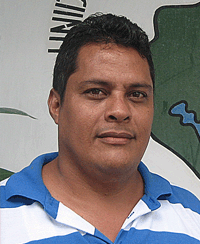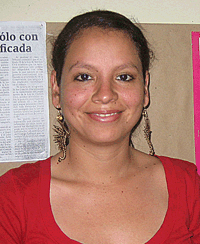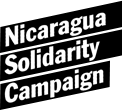Voices from Nicaragua
Domingo Perez urges UK trade unionists to keep fighting
Domingo Francisco Pérez is the General Secretary of the National Union of Employees (UNE), the biggest Union in Nicaragua covering all public services in local government.
He visited the UK from the 14th until the 25th of June to strengthen the links between Nicaraguan and British Trade Unions. He is interviewed here outside the UNISON building in Euston Road, right after signing a collaboration agreement between UNISON and UNE for the set up of a law service for union members in UNE.
Domingo left a message of optimism and solidarity with the current struggles of the working class against the cuts.
He said: “The only way to defend worker’s rights and to build a society based in equality and social justice is in the streets, fighting. This is the example that trade unionism in Europe has given us for over a hundred years. We urge you to continue fighting”
The video is not yet subtitled, but below you can see the transcript of the Interview:
Interview transcript:
Interviewer (Johanna García of HispanTV): Domingo Perez, General Secretary of the Nicaraguan National Union of Employees, the main trade union for public employees in that country, was on a visit to the UK, holding meetings with leaders of several British affiliates who are facing at present a period of cuts and mass redundancies.
Domingo Perez: We have a very close relationship with the trade unions in the UK, but of course methods of struggle in each country are different. A strike here in the UK is not the same as a strike in Nicaragua. Above all, however, we agree with their ways to develop their struggle.
I: Since last year the government of David Cameron has been faced by mass protests from students opposing the sharp rise in tuition fees and workers affected by the cuts and redundancies in the public sector. Now a strike is expected on the 30th of June by teachers opposing a change in the system of pensions which involves making higher contributions over a longer period and receiving lower pensions at the end. According to Perez this type of anti-worker measure is one of the evils of capitalism.
DP: We are quite clear that we have to look at the model. This type of capitalist, neoliberal model does not answer the needs of society. It answers the needs of the rich magnates.
I: Some British trade unions plan a general stoppage next autumn if their demands are not heard. This would be the biggest union action since the General Strike of 1926. Domingo Perez, who represents workers affected for decades by the same type of cuts, supports this type of initiative.
DP: The only way to uphold the rights of workers and to support the building of a new society based in equality and social justice is in the streets, fighting for it. This is the example that our comrades trade unionists in Europe has given us for over a hundred years. We have received this example and now urge you to continue fighting
I: Domingo Perez, General Secretary of the Nicaraguan National Union of Employees (UNE) supports the struggle and left a message of optimism to the British working class, which is experiencing a time of cutbacks and massive redundancies.
That is why British trade unions have called a national demonstration for the 30th of June.
 Interview with Douglas Javier Araica
Interview with Douglas Javier Araica
Douglas is 36 years old and has been a member of the ANDEN for about 12 years. He’s a teacher in a secondary school in Managua.
In answer to my question about the situation during the neo-liberal years (between 1990-2006) Douglas said that they were very difficult both for workers and for the Trade Unions. Trying to survive as an organisation was difficult because of the obstacles the government put in their way since it didn’t want people to be organised. The government often wouldn’t accept Trade Union's legal status and wouldn’t recognise collective agreements.
Workers lost benefits or these were reduced. As a union they had to work twice as hard, they were repressed, they wouldn’t be granted permission to participate in union activities such as marches. Their labour rights were violated. Education was being privatised through the autonomy programme which was like a feudal system where the head teachers were gang leaders and the teachers, slaves. Enrolment went down and the number of children dropping out of school increased. The salaries were terrible. A primary teacher earned the equivalent of US$85 before 2007. Now they earn the equivalent of US$ 176.
How have things improved since the FSLN won the elections in 2007?
Teachers’ salaries have doubled in the past 4 years, this is without taking into account the 'solidarity bonus' (which the government provides to low paid public sector workers).
Douglas emphasised that ANDEN now has a closer relationship with the Ministry of Education. They have a collective agreement with the Ministry that is worth approximately US$3.8 million which gives benefits such as health care, subsidised transport and access to housing projects to the teachers.
Douglas underlined that during 2011 the major struggles for ANDEN and its members are not losing the rights they’ve already won and improving the quality of education, such as the quality of text books, and getting more training for teachers.
With 2011 being an election year Douglas also said that a non-FSLN victory in 2011 would mean the privatisation of education. It would also mean that the Trade Unions would have to work a lot harder because in these years of a Sandinista government they haven’t had to march or take action, they haven’t been repressed; all gains have come about through dialogue.
Douglas also sent the following message to British Trade Unionists: all unions have the same objectives: defending workers’ rights, getting improved salaries or working conditions. The right to work is a universal right because without it one can’t live. “Only unity will make us strong and respected.” Let the unions unite with one voice and stand strong.
 Interview with Arelis López (UNE Public Sector Workers Union)
Interview with Arelis López (UNE Public Sector Workers Union)
Arelis is 29 years old and has been a member of the UNE for five years. She works in the Instituto de Desarrollo Rural (IDR) as an administrative assistant in the financial department.
In answer to the question about the situation during the neo-liberal years she said that very few collective agreements were signed and when they were, they weren’t respected. Many workers lost their jobs, labour laws weren’t implemented and there were very few opportunities for young people to get jobs. There was a lot of corruption, trade unions leaders were fired secretly and a lot of mistreatment of the labour force.
In answer to the question on how things have improved since the FSLN won the elections she said there are more collective agreements and they are upheld, the State is more open to young peoples aspirations, State institutions serve the community better, there’s been a 65% increase in the minimum wage for public sector workers since the FSLN came to power and the lowest paid public sector workers also receive the bono solidario (equivalent to US$ 25 a month). The right to association is guaranteed by the government.
A non-FSLN victory in 2011 would mean losing everything, going back to the bad old days like when the FSLN lost in 1990.
Interview with Jessenia Lovo (CTCP – Informal Sector Workers Union)
Jessenia is 21 years old and belongs to the CTCP 1st district in Managua. She is also Coordinator of the CTCP Youth Section. She has been a member of the CTCP for 5 – 6 years. She sells sunglasses and mobile phone accessories at a set of traffic lights on the road to Masaya and her ambition is to study tourism and hotel administration and become an office administrator.
When asked how things have improved since the FSLN won the Elections in 2007, she said that working conditions have improved in that the police no longer evict them from traffic lights since the CTCP got the government to stop the raids. The CTCP district secretary in each district of Managua is in direct contact with the corresponding police commissioner. The self-employed workers are more respected now and don’t receive so much humiliating treatment from car drivers and passengers. In the CTCP school they’ve learnt how to read and write and what their rights are. She also said it’s important for all CTCP members, particularly young women, to be able to get an education. At the moment she says that only some members are selected to study in the CTCP school.
In a message to British Trade Unions she said that “unity makes us strong”, that being united is the most important thing, and this is how they’ve achieved things to date. They need economic support and solidarity from British Trade Unions.
A translated declaration from the Leonel Ruguma Young Trade Unionists Committee
Long Live May 1st
Comrade workers of all state institutions and municipalities: This first of May, International Workers Day, we celebrate in an atmosphere of job stability alongside a government of the poor, a government that belongs to the workers and to the people in general.
As a young and revolutionary trade union movement we feel very pleased that we have a government that thinks of, believes in, and helps the most needy, and that we have a President that works for the revolutionary transformation of the country in the interests of the most vulnerable.
We young workers of the municipality of Managua want to live in peace, want to work in peace, want a world without violence, and want the sovereignty, dignity and integrity of our motherland, and of all peoples, to be respected.
* VIVA FREE NICARAGUA! *
Nicaraguan workers! Only with this revolutionary government and with Daniel Ortega will we have more jobs. Only with this government will the “Christian and Socialist Solidarity Bonus” - which 152,000 Nicaraguan workers receive – continue, and will we continue to build free education and healthcare for all.
Today we have more freedom to organise trade unions, more collective bargaining agreements, and more workers participating actively in this revolutionary productive process - because the government of President Ortega is re-establishing the rights that were trampled upon during 16 years of neoliberal governments.
With the Frente, with Daniel, we have work and peace. Viva May 1st!





